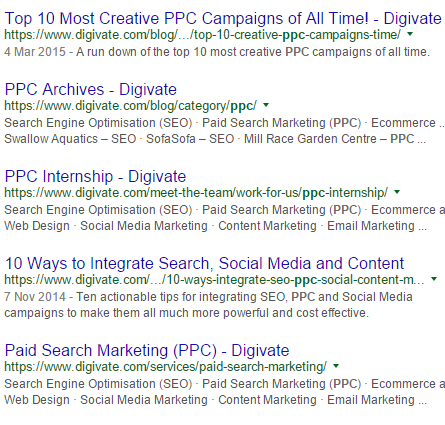
Keyword cannibalisation can dramatically impact the organic search performance of a page. At its best, it can lead to the wrong page ranking from your domain and at its worst it can push the impacted pages off the first page of the SERPS, crippling their organic search performance. Simply put, it’s not unlike driving with the handbrake on and it goes without saying that such an issue is best avoided.
Keyword cannibalisation comes in various forms, some easier to spot than others. Knowing what to look out for can help us identify any potential issues and avoid driving with the hand brake on.

Image Source – Mike Licht (CC Lisence)
Onsite – Internal Keyword Cannibalisation
This is the most common form of keyword cannibalisation and is a case of two or more pages on a single domain containing a particular keyword phrase/theme/topic.
In the below example we can see this is clearly occurring on the Digivate site. Ideally, Digivate wants to rank its PPC services page above all its other PPC related pages for generic terms such as ‘PPC’ and ‘PPC agency’. However, instead we see ‘Top 10 Most Creative PPC Campaigns of All Time!’ and, god forbid, a blog category page (really we should have no indexed that), out ranking the PPC services page.
 This isn’t an ideal situation for Digivate, as the page that is more appropriate for generic PPC search terms is being out ranked, missing out on the opportunity to close business which is its function.
This isn’t an ideal situation for Digivate, as the page that is more appropriate for generic PPC search terms is being out ranked, missing out on the opportunity to close business which is its function.
Usually a sites main navigation indicates to Google the hierarchy of a sites content well enough, however once a similar themed page starts picking up external links and growing in page authority the picture can become confused.
Fortunately, there is a quick remedy for this. Placing internal links within future and past PPC related blog posts to the PPC Services page will indicate to Google the relationship between the pages and which should be favoured. This will allow the PPC service page to outrank other PPC themed pages for generic terms whilst the PPC blog pages can retain long tail traffic and more specific rankings related to the page.
Pro tip: To uncover keyword cannibalisation utilise tools such as PI Datametrics or conduct site searches within Google (e.g. site:digivate.com + PPC Agency) to uncover which pages Google deems as the most appropriate for a search term.
Offsite – Cross Domain Cannibalisation
Cross domain cannibalisation occurs when two domains or more that are owned by a single company, compete for the same products/keyword terms. Instead of owning more retail within the SERPs, the pages and sites actually impede each other’s ability to rank. This can result in losing out on high volume rankings that a site (company) could otherwise hold if it wasn’t for the cannibalisation issues.
Digivate saw this with a client 12 months ago. Papa Pete’s Italian (a made up business name to protect our client’s identity) was a household name in Italian food. Wanting to expand and diversify their business they created the secondary brand, Papa Pete’s Pizza and created a website for it. Soon after this, Papa Pete’s Italian saw a hit in organic traffic. Unfortunately this drop was not spotted by the company. Two years later Digivate started working with Papa Pete’s and uncovered the cannibalisation issue.

Image Source – Monica Kelly (CC License)
Keywords/themes Both Domains Shared
Rankings were poor for Keywords terms that both domains targeted. These were keywords that Papa Pete had ranked on the first page for before the dedicated pizza site launch. This was the first indication that cannibalisation could be impacting the two domains.

Papa Pete’s Italian Domain Specific Keywords
Keyword phrases/topics that featured exclusively on Papa Pete’s Italian continued to perform well in the SERPs and had not seen any serious ranking drops.

Papa Pete’s Pizza Domain Specific Keywords
As with Papa Pete’s Italian, keywords/topics that were only targeted by Papa Pete’s Pizza performed well and continued to climb the SERPs.

Observing this trend across all the shared keywords it was very clear that both sites were impeding each other. To resolve the issue we recommended that Papa Pete choose one domain to benefit from the shared search terms so that at least one domain could benefit from the potential online traffic and business.
Once the domain was chosen to benefit, they could do one of two things:
- Stop the product and services overlap e.g. remove shared page themes/targeting from one of the sites
- Merge the domains and pool resources. This would naturally remove the issue but Papa Pete would lose a good asset i.e. one of their domains
In the end Papa Pete chose to remove the pages on Papa Pete’s Pizza that were targeting similar pages on Papa Pete’s Italian. As a result they recovered all their rankings.
Sub-domain Cannibalisation and International Cannibalisation
Just like cross domain cannibalisation, businesses also need to lookout for sub-domains and international sites that could be causing cannibalisation issues via shared content and/or themes. As such, it’s good to keep tight tabs on your businesses entire online portfolio so issues can be spotted and resolved quickly. Ideally processes would be in place to avoid this to begin with.
How Does Google Understand the Relationship Between the Domains?
Google is pretty clever and its understanding of the relationship between domains, subdomains and international sites can be, for the most part, surprisingly on point. Some of the elements that reveal these relationships include:
- Duplicated site design/templates
- Duplicate content
- Servers
- Backlinks often reveal relationships between sites
- Who Is Registration
- Manual review from someone at Google
Conclusion
The size and diversity of some businesses online presence can be astounding. However, a large presence doesn’t mean you have multiple sites working for you, they could be working against you.

